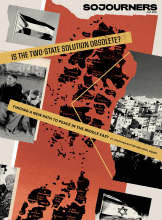DEADLY SHOOTINGS IN Atlanta this spring left eight dead, including six women of Asian ancestry. In the aftermath, Rev. Byeong Cheol Han, lead pastor of Atlanta’s Korean Central Presbyterian Church, exhorted his congregation to “not just pray, not just worry,” because “it’s time for us to act.” Han continued, “I’m going to urge people with love and peace that we need to step up and address this issue, so that ... our next generation should not be involved in tragic ... violence. ... That’s what Christians need to do.”
Han wasn’t alone. Similar calls to action have been amplified throughout Asian American churches. This heightened awareness of faith and culture’s entanglement with sociopolitical realities signals a call to redefine the essential meaning of Asian American Christianity.
For many first-generation Asian immigrants, ethnic-specific churches foster communities of care and cultural preservation essential for survival. For second- and third-generation Asian Americans, our faith provides spiritual resources for negotiating a cultural identity between a majority culture that never fully accepted us and a similarly foreign minority culture from distant shores. Some Asian American theologies focus on this liminality and how God’s presence is with those stuck between worlds.
Read the Full Article

